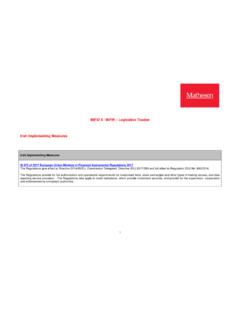Transcription of GUIDELINE ON THE APPLICATION OF THE ... - …
1 UK/979142/6 GUIDELINE ON THE APPLICATION OF THE outsourcing requirements under THE FSA RULES IMPLEMENTING mifid AND THE CRD IN THE UK This GUIDELINE does not purport to be a definitive guide, but is instead a non-exhaustive statement of the measures that common platform firms may adopt in complying with some of the requirements relating to outsourcing under the FSA Rules implementing mifid in the UK.
2 This GUIDELINE focuses only on the UK's implementation of mifid requirements relating to outsourcing . This GUIDELINE is directed at "common platform firms"; in summary those firms that are subject to either mifid or CRD, or both, and are therefore subject to the FSA's common platform of systems and controls requirements set out in the FSA's SYSC Handbook. Please note that this GUIDELINE does not cover the requirements contained in SYSC and SYSC on the outsourcing of retail portfolio management to certain third country firms. In addition, this GUIDELINE does not cover some of the wider aspects of the FSA's regime applicable to outsourcing .
3 For example, it does not discuss the APPLICATION of the approved persons regime where individuals employed by a third party service provider perform controlled functions. This GUIDELINE is up to date as at 16 May 2007. It may be revised from time to time in the light of any relevant changes to the FSA Handbook. If you intend to place significant reliance on it, it would be sensible to check whether there have been any such changes to the FSA Handbook. This GUIDELINE has taken account of "FSA Confirmation of Industry Guidance"(DP 06/5). This GUIDELINE does not alter the meaning of any relevant FSA Rule, nor should it be interpreted as doing so.
4 The FSA has reviewed this GUIDELINE and has confirmed that it will take it into account when exercising its regulatory functions. This GUIDELINE is not mandatory and is not FSA guidance. This FSA view cannot affect the rights of third parties. Structure of this document: Page: Section 1 - Introduction to outsourcing including an overview of the new obligations relating to outsourcing 2 Section 2 - Guidelines to help firms understand when the outsourcing obligation will apply to them 3 Section 3 - Guidelines to help firms understand the nature of the outsourcing obligation and how this will vary depending on the type of arrangement 5 Section 4 - Guidelines to help member firms understand the detailed requirements 9 Appendix 1 - outsourcing under mifid and CRD - Level 1 and 2 Text 19 Appendix 2 - Glossary 24 UK/979142/6 - 2 - SECTION ONE 1.
5 INTRODUCTION TO CHANGES This section summarises the effect of the new FSA Rules implementing the outsourcing requirements of both mifid and the CRD (the "Implementing Rules"). outsourcing under the Implementing Rules The requirements imposed under the pre- mifid FSA regime relating to outsourcing and the requirements imposed under the Implementing Rules are not significantly different. The Implementing Rules are, in many ways, simply a codification of good market practice that existed before mifid . The key difference is that the Implementing Rules contain specific detailed rules, as there were previously no detailed FSA rules on outsourcing by investment firms in the UK (although guidance has been in place for banks and insurance companies for some time).
6 While the definition of outsourcing under mifid is potentially very wide, it is only applicable to arrangements regarding the outsourcing of "critical or important" functions and investment services and activities and, consequently, what is caught within the definition under the Implementing Rules does not differ considerably from what was caught under the pre- mifid FSA regime. mifid applies detailed requirements regarding the measures firms must take to manage the risks associated with outsourcing "critical or important" functions or investment services or activities (the " outsourcing Obligation"). The FSA applies the outsourcing Obligation to all firms carrying out mifid and/or CRD business ("common platform firms") and also applies it as guidance for outsourcing that does not involve "critical or important" functions or investment services or activities.
7 The requirements apply to a common platform firm's material outsourcing in relation to: (i) UK regulated activities whether mifid business or not ( deposit taking activities as well as mifid investment services and activities), (ii) listed activities under the BCD ( lending activities), and (iii) ancillary services under mifid ( provision of investment research). However, the FSA recognises that outsourcing of certain functions in certain circumstances may carry lower risks than others and so provides that where a firm relies on a third party to perform operational functions which are not "critical or important" for the performance of relevant services or activities ("non-material outsourcing ") it is able to take into account the detailed mifid requirements in a proportionate manner.
8 This means that firms may have more flexibility when carrying out "non-material outsourcing " than when outsourcing critical or important functions. What is considered as a "critical or important" function varies according to the nature and circumstances of each firm and the specific arrangements contemplated. What is critical or important for one firm may not be critical or important for another. Firms should note that the requirement under SUP and SUP (1)(e) to notify proposed outsourcing arrangements and significant changes to outsourcing arrangements to the FSA is unaffected by the Implementing Rules.
9 Please see Appendix 1 for full text of the relevant provisions of mifid and the CRD. UK/979142/6 - 3 - SECTION TWO 2. APPLICATION OF THE outsourcing OBLIGATION under THE IMPLEMENTING RULES Definition of outsourcing for Common Platform Firms Glossary outsourcing : means an arrangement of any form between a firm and a service provider by which that service provider performs a process, a service or an activity which would otherwise be undertaken by the firm itself. [Note: article 2(6) of the mifid Implementing Directive] The definition of " outsourcing " under the Implementing Rules is very broad and it is not possible to describe a simple test or a clear dividing line to determine whether an arrangement falls within the definition of outsourcing or not.
10 Firms should exercise judgement in determining whether borderline arrangements should be considered as outsourcing . However, some general principles can be identified which may help firms to determine whether arrangements are inside or outside the definition of outsourcing . (a) In circumstances where a firm provides investment services to its clients and certain elements of the delivery of those services are contracted to a third party: Where there is a direct contractual relationship for the delivery of these services between the third party and the client the arrangement should not fall within the definition of outsourcing .




![g^ÔfYf[aYd afkljme]flkak egj][gehd]p& …](/cache/preview/b/5/9/1/d/b/b/8/thumb-b591dbb864bb015fedab5e78503dfa32.jpg)


